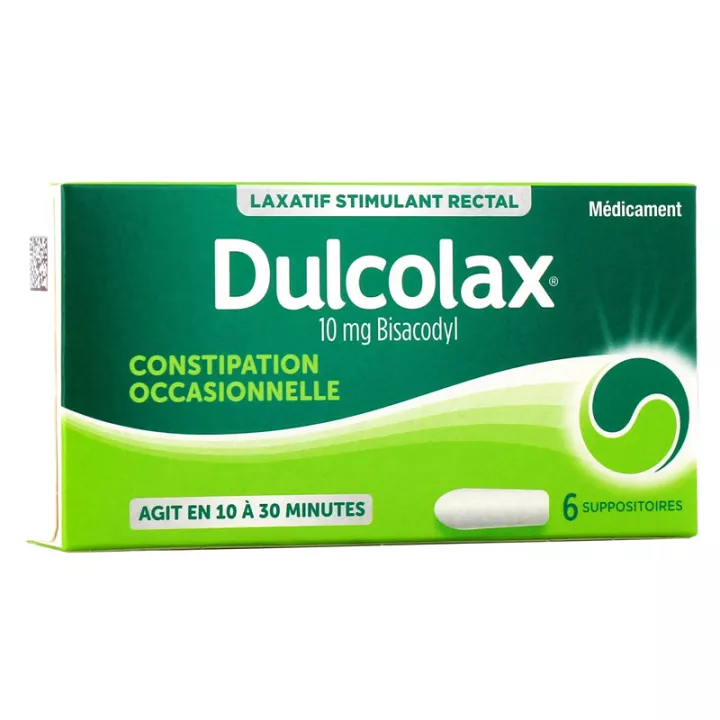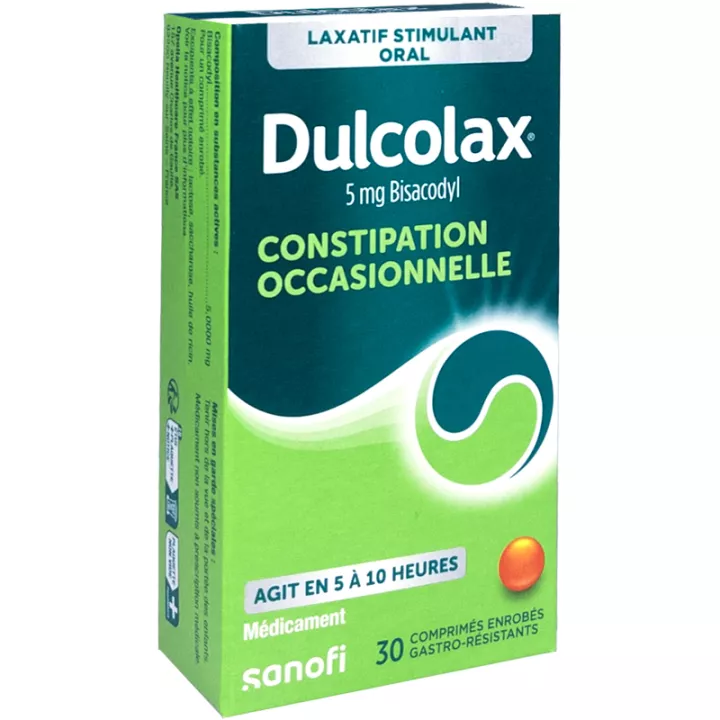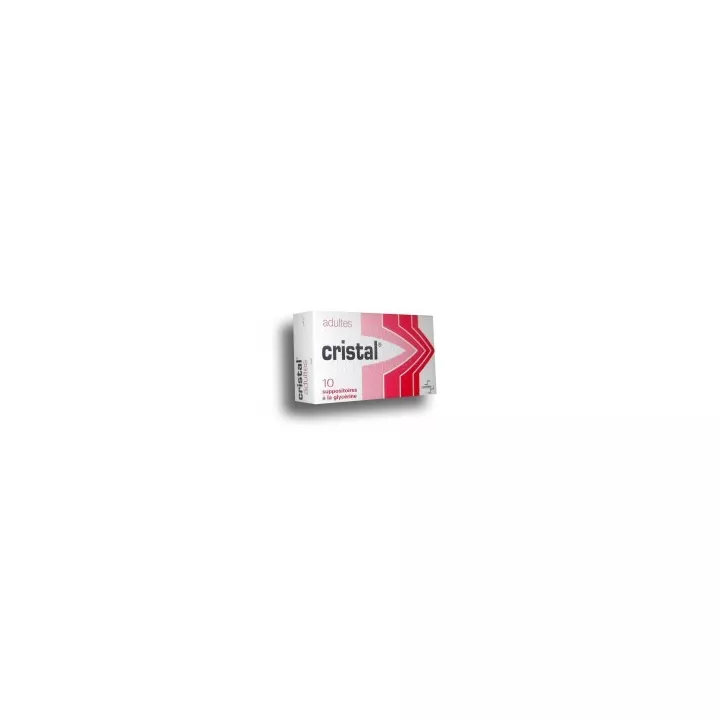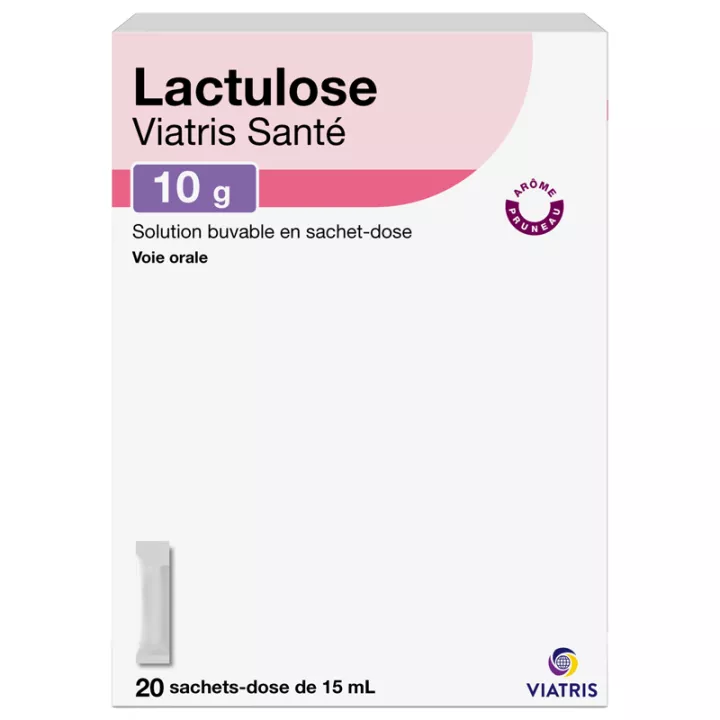NOTICE
ANSM - Last updated: 20/04/2017
Name of the medicinal product
DULCOLAX 10 mg suppository
bisacodyl
framed
Please read this leaflet carefully before you start taking this medicine because it contains important information for you.
You should always take this medication exactly as prescribed in this leaflet or by your doctor or pharmacist.
· Keep this leaflet. You might need to read it again.
· Ask your pharmacist for advice or information.
· If you experience any of the side effects, talk to your doctor, or your pharmacist. This also applies to any side effects not mentioned in this leaflet. See section 4.
· You should contact your doctor if you experience no improvement or feel less well after 10 days.
Review summary
In this notice :
1. WHAT IS DULCOLAX 10 mg, suppository AND WHAT USE IS IT USED FOR?
2. BEFORE YOU USE DULCOLAX 10 mg suppository?
3. HOW TO USE DULCOLAX 10 Mg, Suppository?
4. WHAT ARE POSSIBLE SIDE EFFECTS?
5. HOW TO STORE DULCOLAX 10 mg suppository?
6. ADDITIONAL INFORMATION
1. WHAT IS DULCOLAX 10 mg, suppository AND WHAT USE IS IT USED FOR?
Pharmacotherapeutic group
STIMULANT LAXATIVE.
Therapeutic indications
This medication is recommended in certain forms of constipation and as preparation for certain examinations (rectoscopy).
2. BEFORE YOU USE DULCOLAX 10 mg suppository?
List of information needed before taking the medication
Not applicable.
Cons-indications
Do not take Dulcolax 10 mg suppository if:
· if you are allergic to the active substance or to any of the other ingredients of this medication mentioned in section 6,
· severe dehydration,
· in children,
· certain diseases of the intestine and colon (recto-colitis and other inflammatory disease),
· abdominal pain (stomach pain) of undetermined origin, which may be the sign of a serious illness,
· chronic constipation.
IN CASE OF DOUBT, IT IS ESSENTIAL TO ASK FOR THE OPINION OF YOUR DOCTOR OR YOUR PHARMACIST.
Precautions for use; special warnings
Special warnings
NO EXTENDED USE (UP TO 10 DAYS) WITHOUT MEDICAL ADVICE
Occasional constipation:
It may be linked to a change in lifestyle (travel). The drug may be an aid in short treatment. Any recent constipation unexplained by the change in lifestyle, constipation accompanied by pain, fever, swelling of the abdomen must make seek the opinion of the doctor.
Chronic constipation (long-term constipation):
It should not be treated with a stimulant laxative.
It can be linked to two causes:
· a disease of the intestine that requires treatment by the physician,
· or an imbalance in intestinal function due to dietary habits and lifestyle.
Treatment includes:
· an increase in dietary intakes of vegetable products (green vegetables, raw vegetables, wholemeal bread, fruit ...),
· an increase in the consumption of water and fruit juices,
· an increase in physical activity (sports, walking ...),
· a rehabilitation of the defecation reflex,
· sometimes, adding sound to the diet.
If in doubt, it is essential to seek the advice of your doctor or pharmacist.
Dizzy sensations and syncope, which can occur at the time of defecation, have been reported.
Precautions for use
In case of diarrhea or abdominal pain, the medication should be suspended.
In patients with precarious water balance (eg kidney failure or elderly patients), DULCOLAX should be discontinued and should be reinstated only under medical supervision, due to increased risk of dehydration due to intestinal water loss.
Symptoms can be thirsty and decreased in the amount of urine (oliguria).
Patients may have blood in the stool (rectal bleeding), which is usually of mild and spontaneously resolving intensity. In case of rectorrhagia, consult a doctor.
This medication MUST NOT BE USED, unless otherwise directed by your doctor in association with: amiodarone, bretylium, disopyramide, quinidinic acid, sotalol, astemizole, bepridil, erythromycin IV, halofantrine, pentamidine, sultopride, terfenadine, vincamine.
It is preferable not to use DULCOLAX suppositories in cases of haemorrhoids, anal fissures, recto-colitis hemorrhagic.
IN CASE OF DOUBT DO NOT HESITATE TO REQUEST THE NOTICE OF YOUR DOCTOR OR PHARMACIST.
Interaction with other medicines
Other medicines and DULCOLAX 10 mg suppository
Tell your doctor or pharmacist if you are taking or have recently taken any other medicines.
Interactions with food and beverages
Not applicable.
Interactions with Herbal Medicines or Alternative Therapies
Not applicable.
Use during pregnancy and lactation
Pregnancy
Use of this medication is not recommended during pregnancy
feeding
Use of this medication is possible during breast-feeding.
Tell your doctor if you are pregnant or breast-feeding.
Ask your doctor or pharmacist for advice before taking any medicine.
Sport
Not applicable.
Effects on ability to drive or use machines
Driving and using machines
The effects of Dulcolax on the ability to drive and use machines have not been studied.
However, dizziness and / or syncope may occur due to abdominal spasms. In case of abdominal spasm, avoid potentially dangerous activities such as driving and using machines.
List of excipients with known effect
Not applicable.
3. HOW TO USE DULCOLAX 10 Mg, Suppository?
Instructions for proper use
Not applicable.
Dosage, Mode and / or route (s) of administration, Frequency of administration and Duration of treatment
Dosage
RESERVED FOR ADULTS
1 suppository per day, half an hour before the chosen time for intestinal evacuation.
The maximum daily dose should not be exceeded.
Method and route of administration
Rectal route.
The suppositories should be taken out of their packaging and placed in the rectum, flat end first (to prevent its rejection) tapered tip down.
Frequency of Administration
The suppository should be used half an hour before the time chosen for the intestinal evacuation.
The suppositories generally take effect between 10 and 30 minutes.
Duration of treatment
No prolonged use, greater than 10 days without medical advice.
Symptoms and Instructions for Overdose
If you have used more than 10 mg DULCOLAX, suppository you should have : a correction of hydroelectrolytic disorders in case of very large fluid loss may be necessary. This is particularly important in the elderly and young subjects. Administration of antispasmodics may be useful.
Instructions for omission of one or more doses
Not applicable.
Risk of withdrawal syndrome
Not applicable.
4. WHAT ARE POSSIBLE SIDE EFFECTS?
Description of adverse reactions
Like all medicines, this medicine may cause side effects, although not everybody gets them.
The most common adverse reactions reported during treatment were abdominal pain and diarrhea.
The assessment of adverse reactions is based on the following frequencies:
Very common: affects more than 1 in 10 patients
Common: affects 1 to 10 patients out of 100
Uncommon: affects 1 to 10 of 1,000 patients
Rare: affects 1 to 10 patients out of 10,000
Very rare: affects less than 1 in 10,000 patients
Not known: can not be estimated from the available data
Immune system disorders
- Rare: Anaphylactic reactions, angioedema
Skin and subcutaneous tissue disorder
- Rare: Generalized itching (allergic reaction)
Metabolism and Nutrition Disorders
- Rare: Dehydration
- Not known: decreased blood potassium levels
Nervous System Disorders
- Uncommon: Dizziness
- Rare: Syncope
Dulcolax may cause abdominal pain associated with abdominal spasms and / or defecation, which can cause dizziness or syncope.
Gastrointestinal disorders
- Common: Abdominal pain, diarrhea, nausea
- Uncommon: Blood in stool (rectal bleeding), anorectal discomfort (burning sensation and anorectal pain), vomiting
- Rare: Colitis
If you notice any side effects not listed in this leaflet, or if any of the side effects gets serious, contact your doctor or pharmacist.
Declaration of side effects
If you experience any side effects, talk to your doctor or pharmacist. This also applies to any side effects not mentioned in this leaflet. You can also report adverse reactions directly via the national reporting system : National Agency for the Safety of Medicines and Health Products (ANSM) and network of Regional Centers of Pharmacovigilance - Website: www.ansm.sante.fr .
By reporting adverse reactions, you are helping to provide more information about the safety of the drug.
5. HOW TO STORE DULCOLAX 10 mg suppository?
Keep out of the reach and sight of children.
Expiration date
Do not use this medicine after the expiry date which is stated on the package after EXP. The expiry date refers to the last day of that month.
Storage conditions
Store at a temperature not exceeding 30 ° C.
If necessary, warnings against visible signs of deterioration
Do not throw any medication into drains or household waste. Ask your pharmacist to remove any medications you are no longer using. These measures will help protect the environment.
6. ADDITIONAL INFORMATION
Full list of active substances and excipients
What DULCOLAX 10 mg contains, suppository
· The active substance is:
Bisacodyl .................. .. 0.01 g
For suppository
· The other excipients are: solid hemi-synthetic glycerides (Witepsol W 45).
Pharmaceutical form and content
Aspect of DULCOLAX 10 mg, suppository and contents of the pack
This medication is in the form of a suppository.
Box of 5, 6 or 10 suppositories.
Not all pack sizes may be marketed.
Name and address of the marketing authorization holder and the holder of the manufacturing authorization responsible for the release of the lots, if different
Holder
SANOFI-AVENTIS FRANCE
82 AVENUE RASPAIL
94250 GENTILLY
exploiting
SANOFI-AVENTIS FRANCE
82 AVENUE RASPAIL
94250 GENTILLY
Maker
ISTITUTO DE ANGELI SRL
LOCALITA PRULLI
REGGELLO (FI)
ITALY
Names of the medicinal product in the Member States of the European Economic Area
Not applicable.
Date of approval of the notice
The last date on which this leaflet was revised is {YYYY}.
AMM under exceptional circumstances
Not applicable.
Internet Information
Detailed information on this medicine is available on the ANSM website (France).
Information for health professionals only
Not applicable.
Other
Not applicable.














